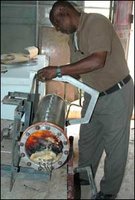
In the first, a commercial for Chevy Trucks uses images of 9/11, Vietnam, and civil rights icons Martin Luther King and Rosa Parks to boost sales. The New York Times writes that, while consumers are accustomed to GM wrapping itself in the flag, this time around their patriotism "took on a more desperate air, all but setting the flag on fire to honor it."
As the commercial begins, an industrial history rolls out, touching the usual icons of the Statue of Liberty, busy factory workers and Americans at their leisure. But then a more conflicted narrative emerges, quickly flashing on bus boycotts, Vietnam, Nixon resigning, Hurricane Katrina, fires, floods, then the attacks of Sept. 11, replete with firefighters.All that’s missing is a plague of locusts, until the commercial intones “This is our country, this is our truck” as a large Silverado emerges from amber waves of grain.
The message seems to be that, even though America has been in the ditch several times during its history, it has always managed to pull itself out. And what is true for the country must be true for General Motors. It could be pointed out that Detroit and General Motors are in a ditch mostly because they drove there, ignoring global competition and consumer needs in pursuit of quarterly profits. But the back story of the disaster is obscured by the universal need to rebound.
Critics have attacked the ad, in part because it also invokes Martin Luther King Jr. and Rosa Parks to sell trucks. But something more subtle, perhaps more cynical, may be at work here: the image of America (and its leading auto manufacturer) as victim, mostly of itself, but still worth loving.
“The first time I saw it, I thought, holy mackerel, they are using negative images to generate positive emotions,” said Bob Garfield, the advertising critic of Advertising Age. “I have never seen that in a commercial.”
“I feel a little violated when I watch it,” he said. “I don’t mind when they have a tent sale on President’s Day, but those guys have been dead for 200 years. I’m not sure I’m ready for a Rosa Parks sale-a-bration.”
 Meanwhile, in Ethiopia, where mortar shells remain embedded in the ground from the 1998–2000 war with Eritrea, one man is taking war's detritus and converting it into useful tools: he's turning burned-out bomb casings into cylinders for coffeepots that brew Ethiopia's famous beans.
Meanwhile, in Ethiopia, where mortar shells remain embedded in the ground from the 1998–2000 war with Eritrea, one man is taking war's detritus and converting it into useful tools: he's turning burned-out bomb casings into cylinders for coffeepots that brew Ethiopia's famous beans.About nine years ago, Azmeraw Zekele came up with the idea of using spent shells for coffee machines after seeing them converted into cylinders for washing machines or "for crushing things." Now, he saws off the pointed ends and drills holes to convert the meter-high aluminum cylinders into brewpots.
Given his product's connection to war, Azmeraw often has to overcome resistance from potential buyers. "Sometimes I think about the fact they were used for war but I want to change them to do something good. They could be a symbol of war but I am doing something good out of the bad."
(Thanks, Stephan and Dad.)
No comments:
Post a Comment